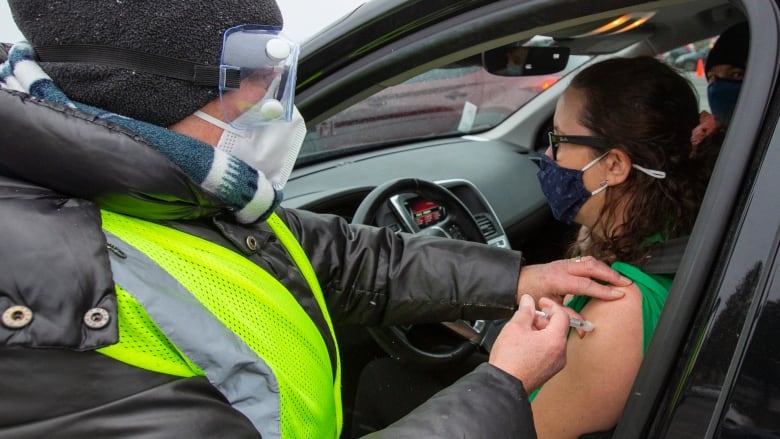Hospitalizations and ICU visits to rise in coming weeks, Ontario's top doctor warns
Province may have to limit access to PCR and rapid tests as demand surges: Dr. Kieran Moore

Ontario's top doctor is warning that the number of COVID-19 patients who require hospitalization and critical care in intensive care units is likely to rise in the coming weeks, as the Omicron variant continues to spread.
Dr. Kieran Moore, Ontario's chief medical officer of health, said at a briefing Tuesday afternoon that the province is experiencing exponential growth and is currently on track to record more new daily cases than it ever has throughout the entire pandemic.
Ontario reported 3,453 new cases of COVID-19 on Tuesday, up 143 per cent from last Tuesday.
Theseven-day average of daily cases climbed to 3,153, its first time above 3,000since May 10. That figure ison pace to double every five days or so.
The current surge, Moore said, caused hospitalizations to increaseby nine per cent compared to last week. While the number of patients in ICUs remained stable, Moore said he expects that numberto grow in the coming days and weeks as case numbers grow exponentially.
"This variant moves quickly, and we need to do the same," Moore said. "There is no question that in the coming days and weeks, we will require ongoing vigilance ... We must stay cautious, disciplined and never underestimate this virus."
Province reviewing testing, contact tracing approach
Moore's warning comes as the province's testing and contact tracing systems strain under the pressure of more people going for testing and a growing number of positive tests. The demand for PCR tests is leading to backlogs in access and long wait times for results in some parts of the province.
Ottawa Public Health has asked residents who have symptoms but can't access a timely test to assume they are infected and self-isolate. A similar strain on testing resources was reported in Kingston last week, and other health units have said they are bracing for the same problems.
Provincial labs have processed an average of 54,000 PCRtests per day over the past week, according to provincial data, which is close to the total capacity of about 70,000 tests.
Moore said the province willreview its testing strategy over the next 48 hours.
"We're not at our full capacity yet, but we want to keep some of it for outbreak management in long-term care facilities, etcetera," said Moore.
"We have to anticipate that as this virus continues to double every few days,which is what it wants to do, that we may have to put some limitations on the PCR and [rapid antigentests] and to be able to use RAT testing for diagnostic purpose[s] if we don't have complete PCR."
Moore said the province also needs to preserve some of its limited supply of rapid tests for healthcare, long-term care and other essential workers who may be a close contact of a positive case, so that they can avoid having to self-isolate for an extended period of time.

Ontario started handing out free rapid tests to the public at malls, liquor stores and other high-traffic locations last week, prompting long lines and frustration from many who left empty-handed when supplies ran out. Two million rapid tests, which offer results in 15 minutes, wereallocated for distribution under that initiative, while others are being provided to workplaces, long-term care homes and other settings.
Some of the test kits have popped up for sale online,prompting a warningfrom the province that people attempting to resell them could be fined for doing so.
Moore said people should be prepared to inform their own contacts and workplaces if they test positive for the virus, asthe province and public health units are focusing their contact tracing efforts on the highest-risk settings, including hospitals, long-term care facilities, retirement homes and other congregatesettings such as shelters.
"Our resources must be prioritized to ensure our most vulnerable are protected, and that health care and essential settings remain open and functioning effectively,"Moore said.
Most vaccinations to date
Public health units collectively administered their highest number of vaccines on a single day since mid-July on Monday. Of the 206,595 shots given out, 187,511 were third doses or boosters, according to the Ministry of Health, while 14,189 were first doses.
The provincial government has said it intends to ramp up capacity in the coming weeksto administer between 200,000 and 300,000 booster shots every day, as Ontario facesa surge of Omicron cases.
Meanwhile, the Ministry of Health also reported the deaths of 10 more people with the illness, pushing the official toll to 10,123.
As of Monday, there were 412 people with COVID-19 in hospitals. That's up from 385 last Tuesday.
There were 165 patients being treated for COVID-related illnesses in intensive care, compared to 162 at the same time last week. Of those, 105 needed help from a ventilator to breathe.
The province says there are 644 adult ICU beds available if the rise in cases is followed by a wave of critical care admissions.
Positivity rates have also continued to spike. On Tuesday, Public Health Ontarioreported a 9.9 per cent positivity rate from 48,096 tests.
Some hospitals said they were suspending non-essential services to brace for the impact of rising infections.Unity Health hospital network in Toronto says it has made the "difficult decision" to pause non-essential ambulatory care and surgical procedures, with the exception of urgent cases.
With files from The Canadian Press












_(720p).jpg)


 OFFICIAL HD MUSIC VIDEO.jpg)
.jpg)



























































































